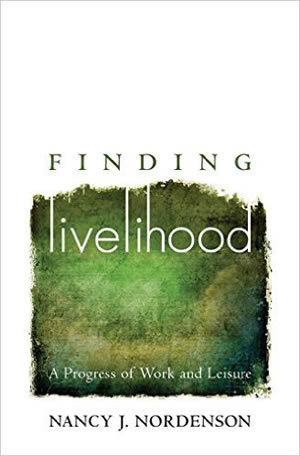Nancy Nordenson’s Finding Livelihood: A Progress of Work and Leisure arrived on my desk at a propitious time. I have struggled for decades to come to terms with a spiritual calling that both demands attention and “refuses” to come to fruition. I’ve written a bit about this frustration in the pages of Notre Dame Magazine. Not everyone receives a spiritual calling, of course, but many do. They are drawn by a “voice” from beyond the horizon and a lure to explore the deep mystery of life. They aspire to follow that lure — if they can. I add that qualification because the need to make a living often presents obstacles to following that spiritual calling.

Nordenson tackles this very dilemma. Finding Livelihood is about vocation, in its root meaning, and the difficulty of heeding it. It’s “about wrestling with work as with any large and powerful force that wants to have its way with you while you simultaneously want to have your way with it.” It is about facing the daunting tedium and dissatisfaction with much of work, and staying attuned to moments of grace along the way.
A freelance medical writer, Nordenson began her reflections during the economic recession of 2008-09, when her husband lost his job and then remained chronically underemployed for years thereafter. “Winds of recession . . . have been blowing through these streets,” she writes, “and no mark of Passover exemption has been made on my doorpost.”
At the time, she and her husband had two children in college and a mortgage to pay. She also had just begun an MFA program in creative writing in response to a deeply felt spiritual calling. And callings obligate, big time. They nag; they cajole. As the [now] primary breadwinner, she had to increase her for-pay writing and defer her spiritual writing in order to keep the family solvent. God calls. We try to respond. Then life happens, and our response is waylaid, deferred, shackled.
Nordenson explores this quandary throughout the book, and she has some questions of God: Why this call that can’t be fulfilled? Have I missed a turn on the road? Have I misread some sign? She contrasts the reality of work to the call she has experienced for living life fully. There’s a shadow side to work where “we are caught in work’s daily grind …. the tasks build; chores swirl one into the other; labor falls heavy.” The messiness of life clutters the path. Competing calls beckon. Which is from God? Which from the world? Which from both? What is the right response? Discernment never ends and the call is not always clear or specific. It’s like journeying through a tangled forest, sweeping aside leaves and fallen branches in search of clues, of a map, a direction. Sweep in a wide-enough arc and a blurred and twisted arrow emerges, and it points somewhere: this way. But life’s demands don’t retreat. They, too, beckon: no, that way! Nordenson’s gift is that she takes note of the transcendent beauty amid the clutter of leaves and competing demands. The spirituality that emerges through her crisp, luminous prose is both profound and serene — a gentle unfolding of grace through the quotidian.
Nordenson admires theologian Frederick Buechner’s poetic phrase about vocation: “the place God calls you to is the place where your deep gladness and the world’s deep hunger meet.” She also finds the sentiment unconvincing. Why? Well, life happens. The need to make a living in tough times and the responsibilities one has to others exert their own call, and those calls obligate as much or more as one’s “deep gladness” and spiritual desire. “Who but a very small minority,” she asks, “can find that exact intersection [of one’s deep gladness and the world’s deep hunger] and from it feed a family?”
The book is neither a memoir nor a sociological examination of work; Nordenson approaches work, meaning and spiritual vocation through personal experience and engagement with great writers and artists from the Christian tradition: Josef Pieper, Thomas Aquinas, Simone Weil, C.S. Lewis, Antoni Gaudí, Peter Berger, Pavel Florensky, Rilke. And, of course, Scripture and the Church’s liturgical season.
The publisher, Kalos Press, is a relatively new publishing house that features writers of serious Christian literature, in contrast to “simplistic inspirational literature” that is merely pious or sentimental. The authors who exemplify the writing Kalos aspires to publish include Wendell Berry, Brennan Manning, Anne Lamott and Henri Nouwen. Nancy Nordenson’s Finding Livelihood fits that profile well.
Kenneth Garcia is the associate director of the Institute for Scholarship in the Liberal Arts at Notre Dame and the author of Academic Freedom and the Telos of the Catholic University (Palgrave Macmillan, 2012). He is completing a spiritual memoir.